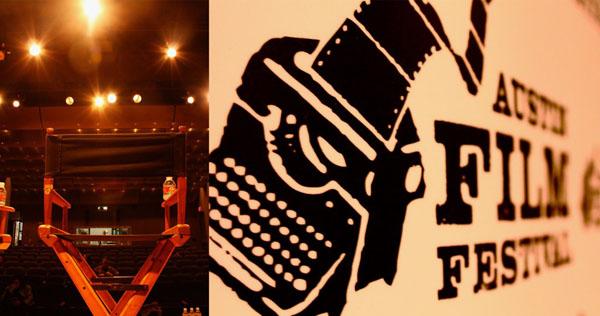Celebrating its 20th anniversary, the Austin Film Festival continues to focus on the work of screenwriters while supporting the launch of careers in the film industry.
Story by María Núñez
Photos provided by austinfilmfestival.com
In 1994, when festival co-founders Barbara Morgan and Marsha Milan wanted to create a week-long festival celebrating film in Austin, they decided to set themselves apart. Creating an event that focuses on not only directing and acting, but screenwriting, as well, the two women brought the Austin Film Festival to life. After 20 years, the Austin Film Festival & Conference remains the only one of its kind.
Originally the Heart of Film Screenwriters Conference, the festival highlighted the work of screenwriters and their role as the core creative process in filmmaking. “When we were first starting, we had some producers give us ideas on what we could do with the festival. One producer, Fred Miller, came up to us and said, ‘Hey, you should do something for writers. No festival has really done anything for the writers of the films.’ And in fact, he was right,” Morgan says. Today, the festival brings together all of Austin’s film community — producers, directors, screenwriters and actors alike — and it also showcases films that recognize the art of descriptive storytelling through screenplays.
Morgan says that one of the challenges starting this type of festival, other than the usual money challenges, was promoting it and trying to get people to attend. “There were already other film festivals out there when we started this one. What we really needed to do was get people’s attention and get them to come to the movies instead of the live music here in Austin,” she explains.
After its first couple of years, the festival slowly began to attract writers and panelists, producers, directors and a general audience. In 1993, 350 people attended the conference. For 2013, the festival expects 15,000 people in attendance. “We had a lot of people who really believed in helping something that was about writers, and people have an emotional attachment to writers, so they really came and gave us a lot of passion and hard work and truly believed in our mission as a festival,” Morgan says. Bringing together producers and screenwriters, Morgan says the festival fosters the sale of screenplays and films, launching long-term careers in the industry. Some of the films screening in this year’s festival, including “Coffee, Kill Boss” and “Cavemen,” began their journey in the industry at the festival years ago in the screenwriting competition. “Coffee, Kill Boss,” written by Sigurd Ueland started its journey with the festival in 2010. Although it was Ueland’s first time to enter something into the festival’s screenwriting cotest, the film was a semifinalist in the comedy screenwriting competition that year. “I decided to apply that year because Austin is just so different. As a writer’s conference, it has great spirit, and the idea of attending a writer’s festival is just so enticing,” Ueland adds. This year, the film will make its world premiere at the festival’s opening night showing.
To compete in the festival, all films must be independently produced. Films that have been distributed in the U.S. or are produced or financed by a major film studio are only eligible for special screenings, not competition. To keep the founding spirit of the festival alive, all awards — with the exception of documentary films — are presented to the screenwriters themselves. The festival has screened films, such as “127 Hours,” “Black Swan,” “The Artist” and “Transamerica,” all of which have either received a nomination for or won an Academy Award. In addition, Danny Boyle’s “Slumdog Millionaire,” which went on to receive the Best Motion Picture Academy Award in 2009, has also received an award in the festival.
The festival attracts notable celebrities, as well. Throughout its 20 year trajectory, Johnny Depp, Owen Wilson, Ron Howard, Wes Anderson, Russell Crowe, Sandra Bullock, John Lasseter, James Franco and Joel and Ethan Coen, to name a few, have made appearances at the festival. The variety of films showcased in the festival has also served towards its international recognition in the film industry. Every year, the festival screens almost 200 films that are placed in one of six categories — narrative feature, narrative short, narrative student short, animated short, documentary feature and documentary short. This adds to the spirit of the festival, Ueland says. “It’s inspiring to see great movies and be able to talk to the writers. It gives you the confidence to go out and make something happen,” Ueland adds.
- All awards at the Austin Film Festival – with the exception of documentary films – are given to screenwriters. Photo courtesy: austinfilmfestival.com
To celebrate its 20th anniversary, the festival, held Oct. 24 through Oct. 31, will hold “an expanded slate of exciting retrospectives hand-picked by this year’s awardees and panelist.” These programmers will select films that have inspired their own work and maintain the festival’s focus on great film writing and storytelling. Some of the guests programmed to showcase these films are writers Vince Gilligan, Shane Black and Norman Steinberg.
To attend the festival, which will take place in several venues around downtown Austin, attendees must register at austinfilmfestival.com and purchase passes ranging from $65-$675. Pass and badge holders, depending on the type purchased, have access to film screenings, pass parties, conferences, exhibits and receptions with some of the festival’s guests and participants.














































